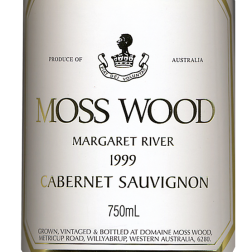Moss Wood 1999 Cabernet Sauvignon
Wine Facts
| Harvested: | 30/3/1999 |
| Bottled: | 11/8/2001 |
| Released: | 2/7/2002 |
| Yield: | 9.22 t/ha |
| Baume: | 13.80 |
| Alcohol: | 14.50% |
| Vintage Rating: | 10/10 |
SOLD OUT
Moss Wood 2022 Cabernet Sauvignon – Ciao Magazine, Winsor Dobbin
If you have a special occasion to celebrate, or someone who deserves a treat then this excellent Bordeaux-style blend would be an excellent choice if you have cash to splash. From one of the best producers in Margaret River this is a complex and rewarding wine that would grace any…
Tasting Notes
The wine has a deep brick red colour and its condition is brilliant. On the nose it is very complex. The primary fruit aromas are the typically Moss Wood redcurrants and mulberries but with additional pretty aromas like cherry and red jubes. These lively aromas seem to be the product of the mild growing season. There are also notes of coffee beans and chocolate and an earthy or olive-like note. The oak is soft and well balanced, giving a toasty background.
On the palate, there are ripe redcurrant fruit flavours which are sweet and mouth filling, as well as some complex cassis and dark plum characters. The texture is soft and silky but the structure is tight, with both acid and tannin providing balance and length. On the finish, the oak flavours add length and the tannins are firm but not aggressive.
This is one of the best vintages of Moss Wood Cabernet Sauvignon and ranks alongside the great years from the property (1996, 1995, 1980, 1975). In terms of style, it shares many of the characteristics of the 1979, although the seasons were a little different - 1979 finished in the rain but 1999 did not. On the strength of this, we are happy to recommend this wine for long-term cellaring and would suggest a minimum of ten years. Having just recently tried a bottle of the 1979, we are happy to report that it survived to 23 years old without any problems so we expect the 1999 to show the same endurance!
Vintage Notes
After two very challenging vintages in 1997 and 1998, the Moss Wood team were hoping for an easier time with the 1999 harvest. Fortunately, the gods were smiling on us because we had a nearly perfect season. There were no hail or disease problems, the winds remained calm and rain fell at all the right times. The birds were kept at bay by the nets and so with all these things in our favour yields were spot on average.
Temperatures during the growing season were generally mild and so all varieties ripened gradually and showed good fruit characters. Indeed, 1999 is one of those rare vintages where, across the range, we were happy with our wines and no one variety stood out as the highlight for the vintage.
The mild season began to cause us some concern by mid-March because the cabernet sauvignon was maturing very slowly and it seemed that it might not ripen fully before the end of April. As there is always a threat of rain by that time of the year, we began to look at the weather forecasts with increasing interest. The first cabernet grapes were picked during the last week of March although they had still not reached our preferred ripeness of 13° Beaume. We therefore stopped harvesting in the hope that some of the forecast warm weather might help our cause. The first two weeks of April were delightful, with clear sunny days and daily maximums in the mid-twenties ensuring that 1999 ripened fully, to be one of the 'great cool years', reminiscent of 1979 and 1990.
Production Notes
In the winery, the production technique was very much in our traditional mode. The fruit was crushed, de-stemmed and pumped into open fermentors. During fermentation, the tanks were hand plunged four times per day, the temperatures allowed to rise to 32°C and at the end, each ferment was pumped over once to reduce hydrogen sulphide.
At this point it is worth noting that, like all the other Moss Wood wines from the 1999 and 2000 vintages, the cabernet sauvignon was fermented with wild, not selected or pure, yeast strains. This is a departure from our traditional technique and one that was applied to enhance the texture and complexity of flavour of the wine. From a quality point of view, we were happy with the results and believe that the spontaneous fermentation did improve the wine. However, the improvement was only small and in our opinion, too small a trade off for the enormous associated risk. Accordingly, we discontinued the process after the 2000 vintage.
As each batch completed its fermentation, the wine was tasted on a daily basis to decide when to press. The time on skins varied from batch to batch but averaged out at around 12 days. After pressing, the wine is transferred to oak barrels for malolactic fermentation. It is then racked, analysed, adjusted and returned to oak. As usual, all barrels are 228 litre French Allier oak, with a medium toast - 50% were new.
The wine spent two years in barrel, after which it was racked to stainless steel tanks and prepared for bottling. The wine was not fined but it was filtered. Since then, the wine has spent the best part of a year lying in the cellar recovering from the shocks and knocks of the bottling process. This ensures that it is properly settled at the time of release, and we hope, able to meet both producer and consumer expectations.
Cellaring Notes
At present, the wine has youthful fruit characters providing enjoyable drinking but its best years are still ahead of it and it can be kept for many years. The minimum cellaring time for Moss Wood Cabernet Sauvignon is 10 years although we recommend a cellaring time of 15-25 years.


